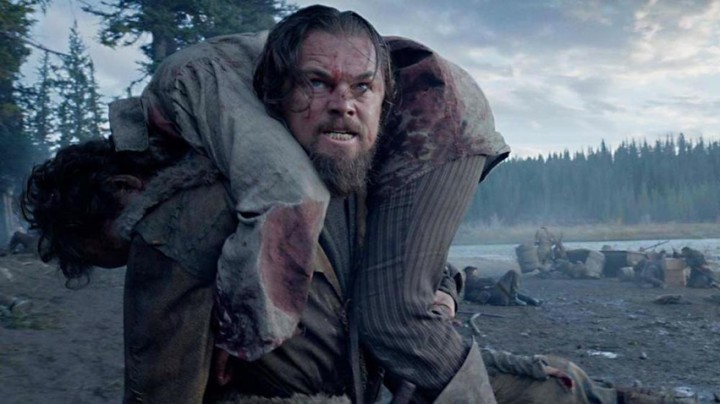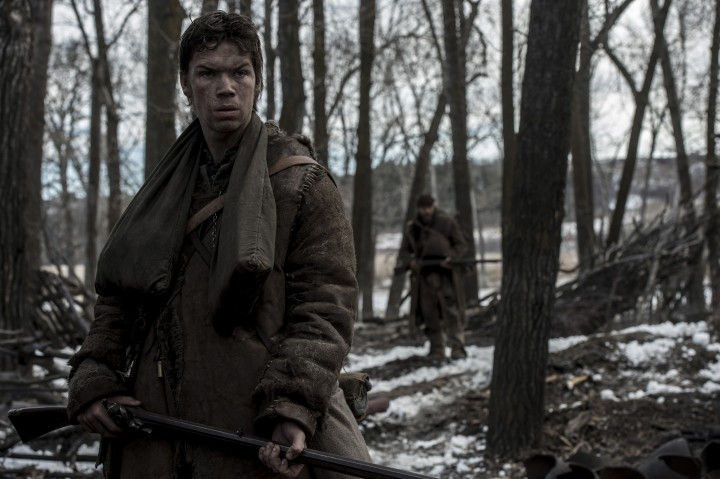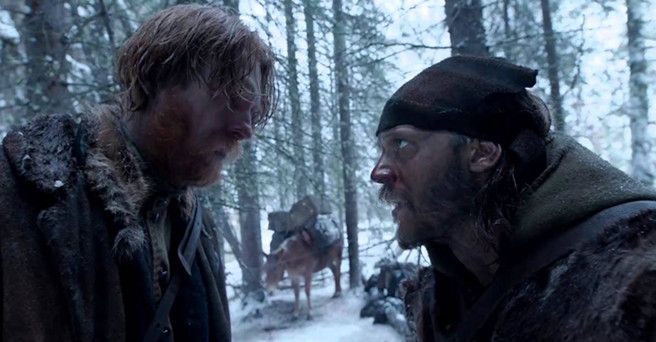Movie Review – Revenant, The (2015)
Director : Alejandro Gonzalez Inarritu
Year Of Release : 2015
Principal Cast : Leonardo DiCaprio, Tom Hardy, Domhnall Gleeson, Will Poulter, Forrest Goodluck, Paul Anderson, Brian Fletcher, Kristoffer Joner, Brad Carter, Lukas Haas.
Approx Running Time : 157 Minutes
Synopsis: A frontiersman named Hugh Glass on a fur trading expedition in the 1820s is on a quest for survival after being brutally mauled by a bear
********
What is it with Spaniards and long-take movies?
If there’s a single word to describe Leonardo DiCaprio’s current Oscar-skirting film, The Revenant, it’s “brutal”. Violent, harsh, compelling, and featuring a performance by DiCaprio that will surely see him land a Best Actor gong, The Revenant’s frontier-set landscapes and inhospitable against-all-odds humanity marks it as one of the best films of 2015. Directed by Birdman maestro (and Academy Award winning) Alejandro Innaritu, The Revenant is loosely based on Michael Parke’s novel of the same name, scripted here by Innaritu and Mark Smith, and contains some of the most desperately realistic depictions of life on the Louisiana Purchase I’ve seen committed to film – as I said, brutal.
 DiCaprio plays Hugh Glass, a trapper on a fur trading expedition deep into Indian territory on the Purchase, when their group is attacked and they are forced to flee. The group’s leader, Captain Henry (Domhnall Gleeson) survives, as does the recalcitrant and selfish John Fitzgerald (Tom Hardy), the latter who has an antagonistic relationship with Glass due to Glass’ half-caste son (Forrest Goodluck) being on the expedition as well. As the party tries to make their way back to their base, a fort some distance yonder, Glass is attacked by a bear whilst on a reconnaissance lark and is severely injured. With supplies dwindling, Glass’s injuries almost killing him, and the constant threat of Indian attack, Henry makes the decision to leave the stricken man behind with three party members until they can return with help. It helps Glass not that one of the men volunteering to stay behind is his nemesis Fitzgerald.
DiCaprio plays Hugh Glass, a trapper on a fur trading expedition deep into Indian territory on the Purchase, when their group is attacked and they are forced to flee. The group’s leader, Captain Henry (Domhnall Gleeson) survives, as does the recalcitrant and selfish John Fitzgerald (Tom Hardy), the latter who has an antagonistic relationship with Glass due to Glass’ half-caste son (Forrest Goodluck) being on the expedition as well. As the party tries to make their way back to their base, a fort some distance yonder, Glass is attacked by a bear whilst on a reconnaissance lark and is severely injured. With supplies dwindling, Glass’s injuries almost killing him, and the constant threat of Indian attack, Henry makes the decision to leave the stricken man behind with three party members until they can return with help. It helps Glass not that one of the men volunteering to stay behind is his nemesis Fitzgerald.
The Revenant is an endurance test of a film; at no time are we given respite from the shockingly harsh nature of existence out in the land, and the constant threat of death lingers in virtually every scene, as the cost of human life becomes cheaper than the pelts the hunting party values so highly. Even worse, the wounded become an anchor around the ankles of those able-bodied, as escape or flight from the enemy is precious currency out in the inhospitable wilderness. Inarritu makes this abundantly clear through the early part of the film, as, once the Indians attack for the first time, the survivors discuss whom to leave behind and which way they should flee; naturally, the moment Glass takes a bear claw to the body he becomes less likely to survive – a point Fitzgerald is quick to point out – and this knife-edge sense of impending death is what drives much of the film’s narrative during its latter two-thirds.
In much the same way Robert Zemeckis’ Cast Away struck a chord as a survivalist picture, with Tom Hanks stranded on a deserted island (albeit a warmer on than the climate DiCaprio finds himself in here), The Revenant tackles similar internal strength motifs as the constant battle against nature and death takes its toll. It’s a journey, this film, less about the destination and more about what it takes to get there. Using similarly long takes that he established in Birdman, Inarritu gives the film a decidedly melancholy frisson, an undercurrent of dread mixed with the grime and mud of the American wilderness. It’s a violent film; bodies are skewered and slit, scalps sliced and limbs rent asunder as Indian attacks are carried out in typically gore-fuelled fashion. Not entirely without merit, either, this kind of depiction, because it adds heft to the subsequent bear attack on Glass (which is probably the most shocking scene of its kind in cinema history – alongside The Edge and the more recent Backwater) and ensures the audience is prepared for a white-knuckle ride where the lead character’s survival ain’t guaranteed.

DiCaprio’s performance is nothing short of astounding, using very little dialogue he takes an iconographic archetype of American frontierism and turns it into a mature, brooding, heartbreakingly real portrayal of a man battling against almost inhuman odds. Flashbacks to his wife, alongside those of his sons, provide a sense of empathy to Glass as more than just another hunter in the woods, and it humanises him moreso than anyone else on the screen, of whom noone else is given much backstory at all. DiCaprio’s ferocity and emotional truth reach similar zeniths to that achieved in The Wolf Of Wall Street, although here they’re hidden behind a swag of mud and a Hobbit-esque bounty of facial hair. It’s a physically demanding, and emotionally draining performance: the entirety of DiCaprio’s emotional work is done through his eyes, and in his achievements here he thoroughly deserves that Oscar.
Accompanying him is Tom Hardy, as the scheming, devious, slimy Fitzgerald, who tries to take almost every avilaible opportunity to kill Glass, and Will Poulter, as the more humane Jim Bridger, a fellow trapper and the one who eventually saves Glass from Fitzgerald’s manic sociopathy. Hardy’s performance is the equal of DiCaprio’s in terms of its musculature, even if the character he portrays isn’t as well developed (or the lead character). The crazy behind Hardy’s eyes is all-too real, although it’s hard to determine if it’s pure hatred or a cowardly sense of his own survival and leaky moral compass that’s driving him into action. In my opinion, Hardy’s Fitzgerald is without redemption – the most dangerous type of adversary – and without compunction: he strikes almost constantly, a wearying battle between himself and Glass, and then himself and Bridger, that transforms the film from a mere “battle against the elements” to a “battle between men” arc, and The Revenant sells this well.
Will Poulter is solid as Bridger, a stand-up kid dealing with the harsh conditions while trying to maintain a moral stance against brutality simply for its own sake. He forms the proxy for the wounded Glass, standing up against Fitzgerald and yet totally outgunned in both presence and personality, and Poulter provides about the only character you could call a “bright light” in this utterly dark film. Domhnall Gleeson, last seen as General Hux in Star Wars: The Force Awakens, is a non-entity as Captain Henry, as bland a portrayal as the film throws up, and could have legit been played by anybody else.
 By all accounts, The Revenant was a nightmare film to make. Shot on location two hours drive from anywhere, in some of the most inaccessible and inhospitable landscapes imaginable, the film’s technical strength is tested even further by Inarritu’s use of long-takes, often two or three minute no-cut edits in which the logistics of character movement, practical effects and narrative beats are contained with the film frame in an unspoken contract with the audience. Accomplishing these kinds of storytelling feats, particularly in the wilderness, is testament to Inarritu’s bravura method of film-making, and as such The Revenant is compelling as a technical exercise at the very least. Emmanuel Lubezki, who lensed Birdman for Inarritu, Gravity for Alfonso Cuaron, and The Tree Of Life for Terrence Malick, gives the film a cool, monochromatic flavouring, a desaturated colour palette draining life from the character much like their lives are drained by the landscape. The Revenant is a hauntingly beautiful film, a hypnotic landscape and stunning photography seeing to that.
By all accounts, The Revenant was a nightmare film to make. Shot on location two hours drive from anywhere, in some of the most inaccessible and inhospitable landscapes imaginable, the film’s technical strength is tested even further by Inarritu’s use of long-takes, often two or three minute no-cut edits in which the logistics of character movement, practical effects and narrative beats are contained with the film frame in an unspoken contract with the audience. Accomplishing these kinds of storytelling feats, particularly in the wilderness, is testament to Inarritu’s bravura method of film-making, and as such The Revenant is compelling as a technical exercise at the very least. Emmanuel Lubezki, who lensed Birdman for Inarritu, Gravity for Alfonso Cuaron, and The Tree Of Life for Terrence Malick, gives the film a cool, monochromatic flavouring, a desaturated colour palette draining life from the character much like their lives are drained by the landscape. The Revenant is a hauntingly beautiful film, a hypnotic landscape and stunning photography seeing to that.
Yet it would be nothing without Inarritu’s direction, which is simply astonishing here. He draws performances from his actors that are mesmerising, near-flawless. He commands the screen with every inch of the frame providing some story plot, using the 2.35 aspect to highlight gun-barrels and dense forested areas and swollen ice-rivers, not to mention the chaotic battle sequences with the marauding Indians. While The Revenant feels documentary-like at times (there’s a lot of similarities here to Cuaron’s Children Of Men), Inarritu’s sense of rhythm and timing, his ability to draw the viewer into DiCaprio’s plight and Hardy’s malignant influence, is the precise measure of an artisan at full strength. The creation of a world so fully involved in itself is the bar being set for others; The Revenant is one of the most engrossing films of the last 12 months.
The Revenant is a film to be approached with caution. The picture painted by Inarritu’s brush here is a desolate, haunting, inescapably human story of survival, a testament to man’s strength in taming both his surrounds and himself – DiCaprio’s performance is stellar, and he’s backed up by a solid cast who provide excellent secondary arcs – and if you can stomach the film’s more viscerally bloody moments (and there’s a few) then you’ll find yourself ensconced alongside Hugh Glass as he traverses the barren, snow-strewn landscape of North America. It’s an unrelenting journey, this one, but boasting strong theatrical and technical merits, The Revenant is utterly brilliant.













Spot on review, Rodney.
I think people who don't consider Leo's performance that great are stuck in the mindset that acting = delivering lines. Leo's performance is amazing because he's able to convey so much emotion by use of his face alone. Most actors working today wouldn't be able to accomplish such a feat. Any awards he wins for this role will be well deserved.
Exactly – acting is a "whole body" talent, not just excellent enunciation. I think Leo conveyed more in a look and a scowl than many actors of his generation struggle to accomplish even a tenth of.
I tend to side with the first commenter. While visually engaging, I left this film mess than impressed. As far as the Oscar goes, in "Black Mass" Johnny Depp far out -did DiCaprio, though I do hope DiCaprio wins as a nod to his consistently stellar performances.
My recent post WTF: The Revenant (2015)
After recently watching Black Mass I'm surprised Depp didn't snag more award glory this year – I think the onslaught for finally giving DiCap an Oscar has brushed aside any competition, to be honest.
I think I'm one of the few who – while still the mastery in the making of this film – didn't find this movie entertaining. It's almost two hours of nothing at times. I don't think DiCaprio was worth his Oscar nomination. It sounds like it was a brutal film to shoot but the ability to crawl in snow doesn't equate good acting in my book. I think the director did an amazing movie making a film in a unique and challenging way and deserves an Oscar but I still think this film is boring.
Each to their own on this one, I guess. The Revenant is not for everyone, sure, but I still think it's one of the best directed, and acted films of the last 12 months. At a technical level it's probably THE best, considering how, where and why the production filmed in such isolated areas of the world..